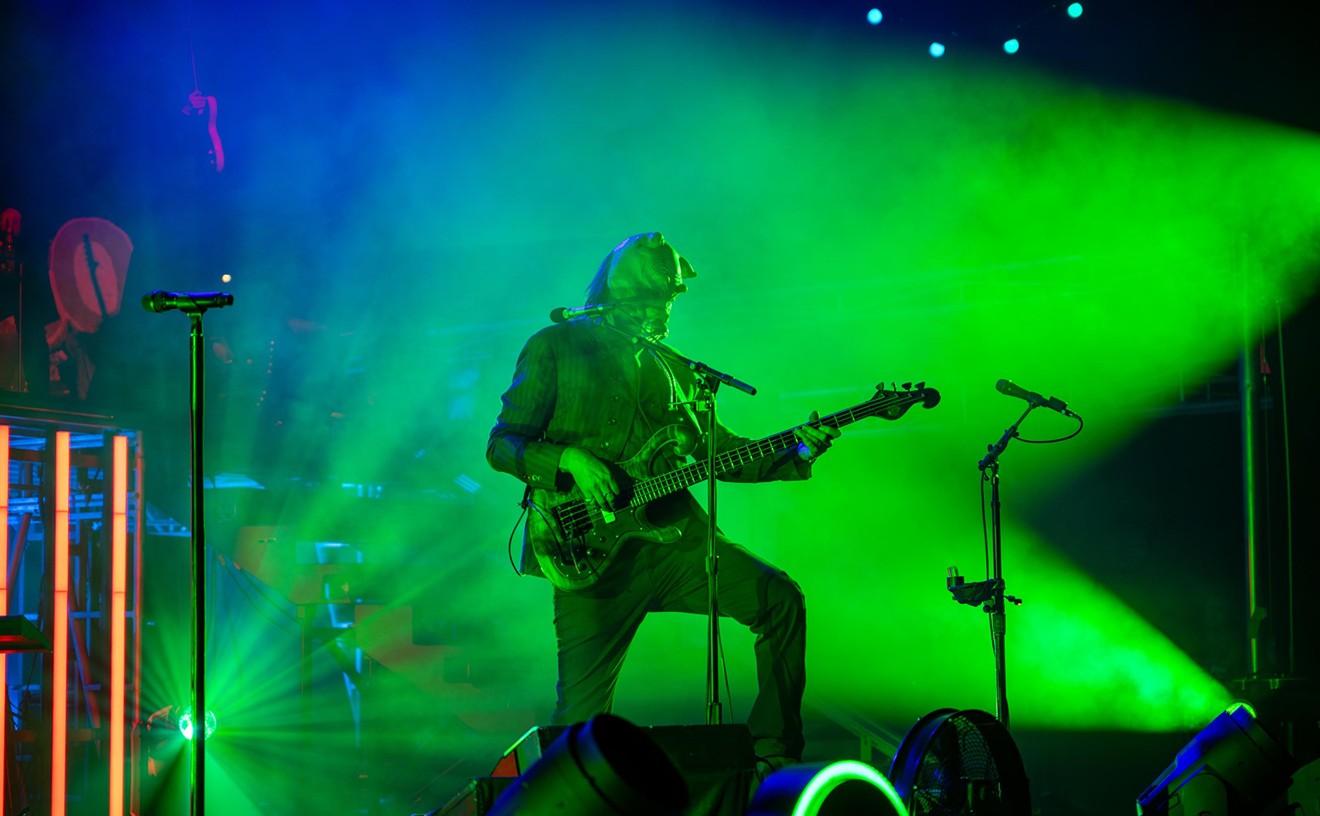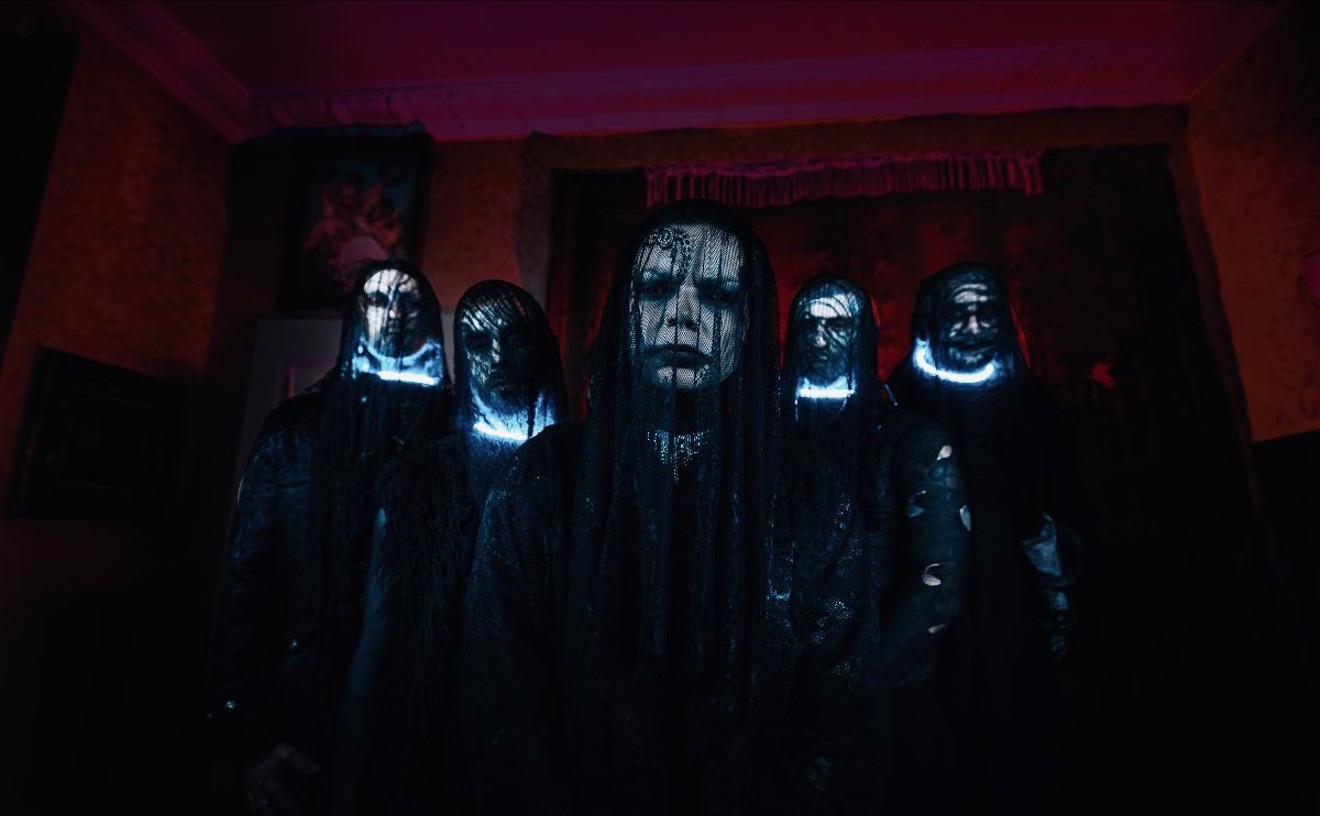Surely there must have been a higher calling than it just "felt right," as the group's bio vaguely notes. Bands don't get together just because it feels right. There's usually another motive: getting laid, staving off teenage ennui, or as an excuse to fire up the old bong every night. Something. Anything. Somehow, though, you can't help but believe Schiltz; he seems so genuine and no-nonsense when he talks about where the band is coming from and where it belongs.
Longwave -- guitarist Shannon Ferguson, bassist Dave Marchese, drummer Mike James, and Schiltz on guitar and vocals -- is a rock band with humble, lunch-pail roots. "My dad actually found my first guitar in the garbage on the way home late one night," Schiltz relates. "I came down the next morning, and he had fallen asleep on the couch with the guitar just sitting there, and I thought, 'My dad's the coolest!'" Some people pick old chairs out of the garbage, to be refurbished and made functional once again. Others call it a good day when a discarded lamp is found to provide light and prolonged life as a reading companion. It speaks to the blue-collar, bootstrap values of his upstate New York roots that Schiltz's father would score a guitar that would help carve out and secure a future for his son.
Perhaps it's no coincidence, then, that the sounds of another working-class musician first caught the ear of a five-year-old Schiltz. "The first record I owned was Bruce Springsteen's Born in the U.S.A. ," says Schiltz. "My aunt bought it for me. I had this Fisher-Price record player and used to play it all the time."
Rochester, New York, is situated on Lake Ontario, about seventy miles east of Buffalo. It's an industrial community, historically a factory town, and it gets damn cold in the winter. Schiltz explains that its natives are "good, honest people, if that doesn't sound too cheesy," and that the community consists of "T-shirt-and-jeans kinda guys that just get up and go to work each day."
The city is also home to Kodak, which employs 24,000 of its citizens -- and it was the thought of working a dead-end factory job that motivated Schiltz to play music. "I worked for a branch office of Kodak for a while. I did about 30 or 35 different jobs, and it just soured me on the whole thing. I knew that was one avenue I wasn't going to go down. So I ended up moving here [to Brooklyn]."
Longwave officially formed in 1999. Schiltz met bass player Marchese, and the two clicked when the bassist heard strains of Gotham post-punk legends Television in the songs that had, until that point, been relegated to Schiltz's bedroom. Together they found a drummer and began fleshing out ideas.
Not long after, guitarist Shannon Ferguson introduced Schiltz and Marchese to his small recording studio, where they began work on their first demos. After committing three songs to tape, they attracted the attention of Rob Sacher, owner of the small indie imprint Luna Sea Records. Sacher offered to put out their first album if they paid for it.
Longwave cut its first disc, Endsongs, in 2000 and released it in September of that year. Ferguson was enlisted on second guitar and Schiltz was drafted as the singer, since the songs were his; the record marked his first time as a vocalist. "I'd sing to myself when I'd write songs," he says. "I never thought about doing the songs in front of anybody; I'd just sing them to myself. And that was the only real singing I ever did until we started playing shows."
It was around this time that Longwave's drummer decided to leave the band. Schiltz put in a call to an old childhood friend from Rochester (James) and asked if he would complete the lineup just as they were planning to lay down the songs "Tidal Wave" and "Exit" for an EP they hoped would attract a record deal. As luck would have it, the manager of another emergent band from New York, the Strokes, offered the members of Longwave an opportunity to open a few shows for the burgeoning superstars. After hearing them play, the Strokes asked Schiltz and company to join them on the rest of the tour.
"It was when things first really started happening for them," says Schiltz. "I think it was nice for them to have us around, because we weren't like, 'Holy shit, you're the Strokes!' -- because we had known them for a while. On the other hand, it was so much better for us, because we learned so much from those guys about being nice to people [on tour]. It was real educational for us. We just got to watch them -- the way they interacted with people and the way they were in control when they played. They were just very, very confident when they played. It was good for us to see."
Despite the connection and the fact that Longwave also calls RCA Records home, the Strokes were not instrumental in getting the band a deal, although they did help Longwave feel more comfortable with its decision to sign with RCA. "They just made us feel better about it. We had a couple of other labels we were talking to, but the Strokes made it clear to us that they were very happy there," says Schiltz, who points to the hefty amount of creative control the band has over its work as one of the benefits of the deal. At the same time, he is realistic about Longwave's place on the roster: "I think they have different expectations for us than they would for Christina Aguilera, you know?"
Longwave was inking the deal with RCA just as the foursome was gearing up to record its second full-length with producer Dave Fridmann (Flaming Lips, Mercury Rev, Mogwai) at his Tarbox Road Studios in upstate New York. Schiltz describes Fridmann as "wonderful" and says of the process, "We liked it a lot. It was the best experience recording that I've ever been in, and that's why we want to go back again. We had big conversations about what we'll do with the next record as well. He's amazing; he's a brilliant engineer."
With Fridmann at the helm, it's not surprising that Longwave's latest album, The Strangest Things, at times conjures up Deserter's Songs-era Mercury Rev -- though Schiltz is quick to point out that the keyboard-heavy sounds on the record are all organic. "There's not a lot of keyboards on the record. A lot of the stuff that sounds like keyboards is actually guitar. That's all from us -- that's what we sound like live.
"The major contributions [by Fridmann] were probably in the drum sound and the bass -- the power of the sound and the fact that it sounds kind of 'fat,'" he adds. "That's what we wanted. We wanted a good, solid rhythm-section sound." Anyone who is familiar with Fridmann's production on the last two Flaming Lips albums will surely find purchase in that statement, as The Soft Bulletin and Yoshimi Battles the Pink Robots both feature up-front kick drums.
Schiltz takes exception with those who would call Longwave derivative. Music pundits have likened the band's sound to U2 or Radiohead -- a musical acme that Schiltz doesn't shy away from; he openly admits that the former's The Unforgettable Fire is a "beautiful album" and a touchstone for his songwriting. But it's also a comparison that he's reluctant to make himself. "That's your job, isn't it? I'll say Radiohead or U2, and then we'll be in a spot, won't we?" Perhaps finding an equivalent that makes him happy is more of a stretch. "If anyone was going to take the time to write up what we sound like, I would hope that it would be something like 'We are a rock band with interesting guitar arrangements.'"
Schiltz is also dismissive of any talk of the band being some sort of American "shoegazer" act. "No, no, I don't like that," he says. "When I hear 'shoegazer,' I think of watching a guy on stage just staring at the floor who can't sing, and the songs are too long. That's what I always think when I hear that word."
If Longwave is truly just a rock band, plain and simple, then what is to be made of all the talk that rock is dead? "I feel like that comes around all the time. A year ago, rock was back," he notes, pointing to the recent popularity of the Strokes, the Hives and the White Stripes.
In the fall, RCA is going to start the big radio push, but in the meantime, the label has been very accommodating of the band's wishes to remain on the road as much as possible to build a following. "Basically, we're trying to work as much as we can right now through touring. More and more people show up every time we pass through a city. We don't know any other way, really," says Schiltz, exposing the work ethic that has taken his band out of Rochester and carried it around the world.
"The line is 'The strangest things are happening to me,'" he says, referring to the album's title track, "and when I heard it for the first time, I thought, 'Right, that makes sense.' Because we were ready to break up as a band before our drummer joined, and six months later, we were quitting our jobs to sign with RCA and making a record with Dave Fridmann."
Kind of like a dream come true, then? "Yeah -- again, it sounds like a Hallmark card or something."










